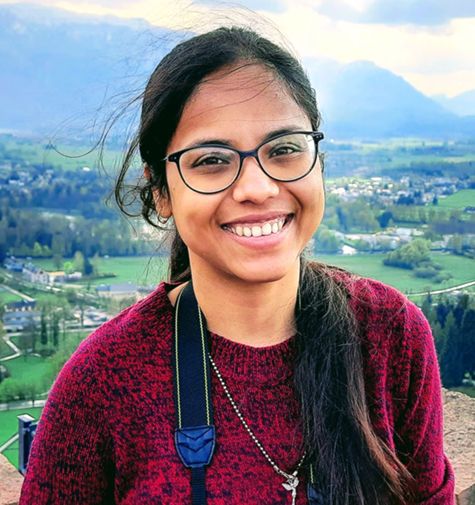Researching up a storm: Sanchita Pal, Ph.D., discusses her work studying solar storms

Sanchita Pal, Ph.D., is a NASA Postdoctoral Fellow studying solar storms at the Goddard Space Flight Center in Maryland. In this episode of Further Together, Pal discusses the planetary impact of solar storms. “Earth has a magnetosphere, so that actually protects us from the heavy impact of these solar storms. But other planets like Mars and Venus, which do not have magnetospheres, are very much affected by these kinds of storms because they can lose their atmospheric mass, which is a huge field of study right now, as we are planning to go to Mars in the Artemis Mission.” Pal talks about growing up in India, moving to Finland for her research, how her interest in solar storms began, and how she leapt at the NPP opportunity.
Center: Goddard Space Flight Center
There’s a big difference between India and Finland, and an even bigger difference still between that and the United States, but that difference is miniscule when you compare the three to the surface of the sun. These are the areas of interest to Sanchita Pal, Ph.D. Pal is a native of India, but moved to Helsinki, Finland, for her postdoctoral research. She is now a participant in the NASA Postdoctoral Program (NPP) at Goddard Space Flight Center in Maryland. The common thread connecting all of these locations has been Pal’s research, which is solar storms.
“I did my Ph.D. in India, in the Central Institute,” explained Pal in a recent interview for Further Together, the ORAU Podcast. “My research field was mostly on solar storms: how the solar storm behaves, how they originate from the sun. These are all things I did during my Ph.D. And after finishing my doctorate, I went to the University of Helsinki, Finland. I did my first two years of postdoc, and I had a very good experience there, the weather and the new culture, everything. And when I finished that, and I got this opportunity in Goddard with the NPP and I did not want to miss the opportunity.”
Pal has spent her academic career studying how solar storms have impacted Earth, as well as the other planets in the solar system.
“Solar storms have a planetary impact,” she said. “Earth has a magnetosphere, so that actually protects us from the heavy impact of these solar storms. But other planets like Mars and Venus, which do not have magnetospheres, are very much affected by these kinds of storms because they can lose their atmospheric mass, which is a huge field of study right now, as we are planning to go to Mars in the Artemis Mission.”
In the course of her research at NASA, Pal studies the effects of solar storms on space-based systems, such as the astronauts on the International Space Station, communications spacecraft, navigational spacecraft and more.
“These solar eruptions have high energetic particles and radiation, so they can heavily impact the space-based system,” she said. “These systems are highly impacted by those kinds of eruptions. I don’t study howthey impact, but I study mostly what properties are responsible for the impact and whether we can predict them or if we can automatically detect them.”
Even though her current field of research is more celestial, Pal first became interested in solar storms because of the effect they have on most people’s everyday life.
“I came to my higher study because I did a project on this field, and this project actually helped me, motivated me into coming to this area where I am currently,” she said. “The project was mainly on how the sun influences our GPS system. The system which we use every day, how the GPS is influenced by the solar impact. When I think about that project, that was very preliminary work, but that motivated me. That motivated me to come into my field.”
One of the benefits of the NPP is the freedom to work on different projects. Pal discussed the fact that her mentor encourages her to collaborate with others. She recently traveled to India and was able to work with professors to see how artificial intelligence can be used in her research. This is in addition to the collaborative environment that working with interns provides. Most people assume that interns are only present to learn, not to teach. But Pal mentioned that she and her mentor also have a lot to learn from interns.
“Sometimes we take the interns and we learn from them, and I love to teach them my field,” she said. “And the interns, they also help our work. That's a good thing here. I'll say briefly that this gives me a lot of opportunities and freedom to work in my interesting field. This is a rare thing to get. What you like, you are doing that and you are paid for that.”
Pal couldn’t list enough benefits of the NPP—from the networking opportunities which allow for collaboration, to the benefits, to the freedom to pursue multiple research opportunities—it’s clear how valuable she’s found this fellowship. She finished the interview by reminiscing about her recent trip to India, during which she’d spent time with family in addition to working.
“It was my work trip as well as seven days I was with my home, my close ones,” she said. “After I came back from there, I am fully energized now. The NPP gives me these all things together and that's a really great thing.”
